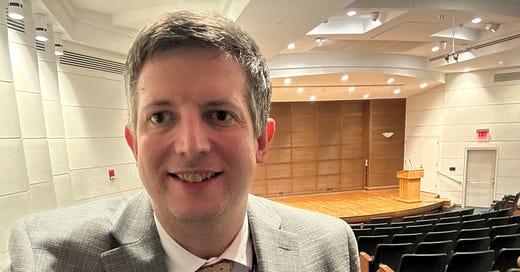Once final grades for the semester are submitted and the students go home, it is “conference season” for many Catholic theologians. The College Theology Society (CTS), the Catholic Theological Society of America (CTSA), and the Academy of Catholic Hispanic Theologians of the United States (ACHTUS) all hold their annual meetings in the last days of May or in the first half of June, and some institutions at times host smaller gatherings, as well. Rare is the theologian who has the stamina to attend more than two of these conferences within such a short time span.
This past weekend, I was able to attend the College Theology Society’s annual convention at the University of Dayton, in Ohio. As I mentioned earlier this week, I was not able to attend the entire conference, not because of a lack of stamina, however, but because I had competing obligations that weekend.
In his 2023 presidential address, the then president of the CTS Brian Flanagan suggested that Catholic theology in the United States is in a state of crisis. On the one hand, like other disciplines in the humanities, undergraduate theology programs have struggled to attract students anxious about financial security and holding to a too-narrow notion of career preparedness. University boards of trustees likewise focused exclusively on revenue generation have diminished the place of the humanities in core curricula and in some cases even eliminated humanities programs. On the other hand, many Catholic universities and colleges have neglected the place of theology in the Catholic intellectual life, and the US Catholic bishops, in part as a result of their mutually distrustful relationship with theologians, have hardly protested. In the midst of this gloom, however, Flanagan called for hope, seeing an opportunity for theologians to recommit to their vocation in a spirit of humility.
This year’s CTS convention, which had the theme of “The Locus of the Theological Vocation,” was the society’s attempt to give an account of that hope. The convention opened with a plenary address by Fr. Agbonkhianmeghe Orobator, SJ, since 2023 the dean of the Jesuit School of Theology at Santa Clara University. He was previously the president of the Jesuit Conference of Africa and Madagascar, and in 2023 and 2024 he was a delegate at the Synod on Synodality after having participated in the African continental stage of the synodal process. Orobator set the stage for the rest of the conference, outlining the many challenges facing Catholic theologians in the US. He pointed to the institutional crises mentioned in Flanagan’s earlier address, but he also lamented the impact on Catholic higher education institutions of Trump administration policies cutting funding for academic research, eliminating diversity, equity, and inclusion (DEI) initiatives, and more recently revoking the visas of international students. Orobator insisted that university administrators must be steadfast in living out their institutions’ Catholic mission as they respond to these challenges, and theologians should be willing to stand up for their students. One might say that the challenges of the present day can serve as a refining fire, renewing the vocation of both Catholic institutions of higher education and the theological profession.
Keep reading with a 7-day free trial
Subscribe to Window Light to keep reading this post and get 7 days of free access to the full post archives.




